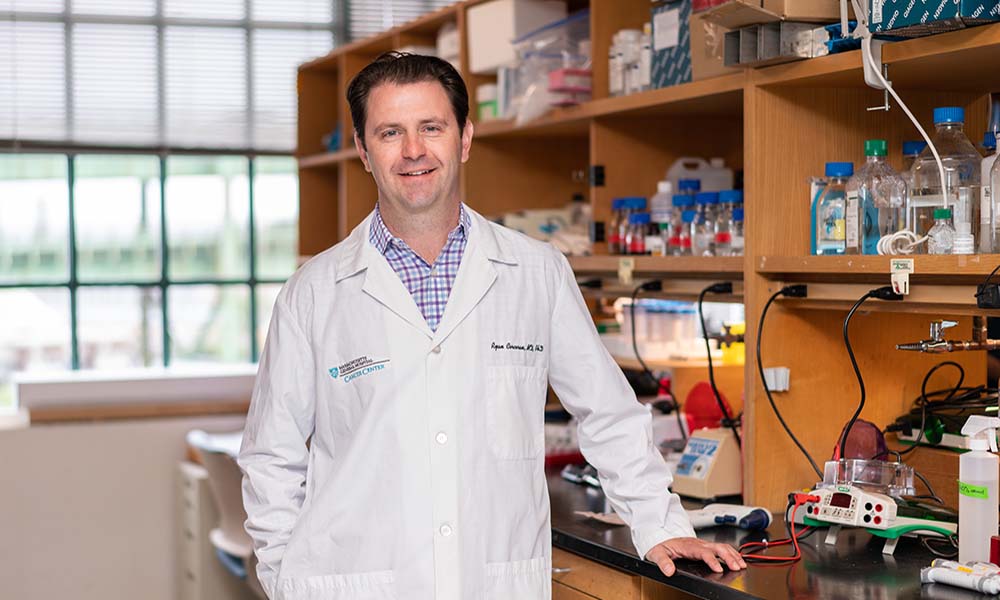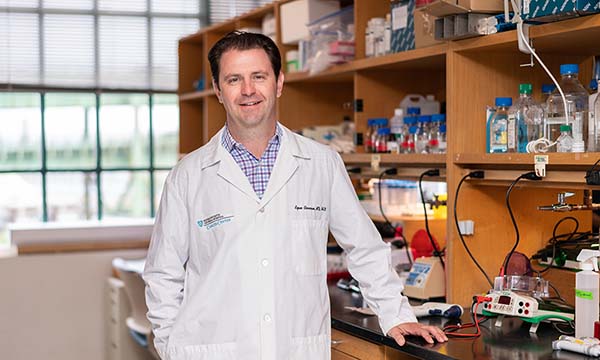Researchers Uncover How Tumors Become Resistant to Promising p53-Targeted Therapy
A new study by Mass General Brigham investigators identifies mutations that drive clinical resistance to rezatapopt treatment.
Krantz Family Center for Cancer Research
Contact Information
Mass General Brigham Cancer Institute
149 13th St, 7th floor
Boston,
MA
02129
Email: rbcorcoran@mgh.harvard.edu
Ryan B. Corcoran, MD, PhD
Director, Cancer Institute-Tucker Gosnell Center for Gastrointestinal Cancers
Mark J. Kusek Endowed Chair in Colorectal Cancer
Associate Professor of Medicine
Harvard Medical School
Program Affiliations
Krantz Family Center for Cancer Research
The Corcoran laboratory focuses on developing new and effective therapies for gastrointestinal cancers, including colorectal, pancreatic, stomach, and esophageal cancers, by targeting the specific survival signals that are active in a given patient’s cancer. Our research utilizes targeted therapies, which are drugs that inhibit signaling pathways activated by the specific mutations that drive individual tumors. Since cancer cells often become resistant to these targeted therapies by activating alternative signaling pathways, we focus on identifying these key resistance signals in cancer cells. We utilize this information to devise effective combinations of targeted therapies that anticipate and ultimately overcome these mechanisms of drug resistance. Overall, our goal is to develop promising therapeutic strategies that can be evaluated in clinical trials for patients whose cancers are driven by specific mutations.
Historically, the standard clinical approach for patients with advanced cancers has been to treat all patients with the same tumor type with the same generalized chemotherapy strategy. However, even among patients with the same type of tumor, the genetic mutations driving tumor growth in each individual patient can be vastly different. As an alternative approach, by identifying the key gene mutations present in an individual patient’s tumor, we can “personalize” therapy by matching each patient with specific therapies that target those mutations essential for tumor growth. Our laboratory focuses on developing targeted therapy strategies directed against specific mutations commonly found in gastrointestinal cancers, including cancers with BRAF and KRAS mutations. However, while targeted therapy strategies can lead to dramatic tumor responses, clinical benefit is often limited by the ability of tumor cells to evolve and develop resistance to therapy. By identifying and understanding the key signals driving resistance, our laboratory aims to devise combinations of targeted agents that can overcome or even prevent resistance.
BRAF mutations occur in 10-15% of colorectal cancers and confer poor prognosis. While BRAF inhibitors have shown dramatic anti-tumor activity in melanomas harboring BRAF mutations, these agents are ineffective in BRAF-mutant colorectal cancers. Therefore, our laboratory has focused on determinants of resistance to BRAF inhibitors in BRAF-mutant colorectal cancers. We have found that reactivation of the MAPK signaling pathway (often mediated through EGFR), contributes to the relative insensitivity of BRAF mutant colorectal cancers to BRAF inhibition. However, we found that combining BRAF inhibitors with EGFR and/or MEK inhibitors can overcome resistance, leading to improved efficacy (Cancer Discovery, 2012). We have also identified multiple mechanisms of resistance that can arise to these newer BRAF inhibitor combinations, and are utilizing this information to develop therapeutic strategies to surmount resistance (Cancer Discovery, 2015; Cancer Discovery, 2018).
KRAS is the most commonly mutated oncogene in human cancer, mutated in ~20% of all cancers, including pancreatic (~90%) and colorectal cancers (~40%). Currently no effective therapies exist for KRAS-mutant cancers because KRAS itself has proven difficult to target directly with small molecules. Currently, our work focuses on identifying novel target pathways in KRAS-mutant cancers through hypothesis-based and large-scale pooled RNA interference screening approaches, with the goal of developing new targeted therapy combination approaches for KRAS-mutant cancers. We have identified adaptive feedback signals that impede the ability of MEK inhibitors to suppress MAPK signaling and have explored the role of novel agents (ERK inhibitors) or convergent signaling nodes to overcome feedback. We have expanded these approaches to identify other potentially effective targets in KRAS-mutant cancers, including direct KRAS inhibitors. Despite promising clinical responses in KRAS-G12C mutant NSCLC, there has been limited efficacy of G12C inhibitors as single agents in colon cancer. To address this limitation, we have defined key mechanisms of adaptive feedback resistance in response to KRAS inhibition and have employed vertical pathway inhibition strategies targeting the RAS-MAPK pathway as described in a recent publication (Clinical Cancer Research, 2020).
The overall goal of our research is to develop improved treatments for patients with gastrointestinal cancers and to identify molecular markers that may help us identify those patients most likely to respond to a given therapy. As such, our laboratory takes a highly translational approach to bringing new therapeutic strategies into the clinic for evaluation in novel clinical trials. Based on our observations, we have launched several clinical trials of BRAF inhibitor combinations in BRAF-mutant colorectal cancers that are showing increased efficacy (J Clinical Oncology, 2015). We have also developed a clinical trial combining the BCL-XL/BCL-2 inhibitor navitoclax with the MEK inhibitor trametinib in KRAS-mutant cancers.
To guide our laboratory investigations, we are utilizing key clinical specimens, including tumor biopsies and patient-derived tumor models to understand how tumors become resistant to therapy. We also utilize serial blood collections for circulating tumor DNA analysis to monitor the tumor heterogeneity and clonal dynamics associated with the emergence of therapeutic resistance (Cancer Discovery 2015, Nature Medicine 2015, Cancer Discovery 2016, Cancer Discovery 2017, Cancer Discovery 2018.)
A postdoctoral position is available in the laboratory of Dr. Ryan Corcoran at the Massachusetts General Hospital Cancer Center/Harvard Medical School. Our research focuses on developing new and effective therapies for gastrointestinal cancers, such as colorectal and pancreatic cancers, by targeting the specific survival signals that are active in a given patient’s cancer based on its mutational profile. Since cancer cells often become resistant to targeted therapies by activating alternative signaling pathways, we focus on identifying these key resistance signals and utilizing this information to devise effective combinations of targeted therapies to overcome resistance and provide novel strategies for evaluation in clinical trials.
Current projects in the laboratory include: synthetic lethal RNAi-drug screens to identify novel targeted therapy combinations for KRAS mutant cancers; modeling resistance to RAF inhibitor combinations in BRAF mutant colorectal cancers and understanding key changes in signal transduction; and whole exome sequencing of paired pre-treatment and post-progression biopsies from patients with GI cancers who progress after an initial response to a targeted therapy regimen, in order to identify key alterations involved in clinical acquired resistance to therapy.
Applicants should be highly motivated, must have an PhD or MD or equivalent, and no more than three years of postdoctoral experience.
To apply, email a cover letter, CV, and three letters of recommendation to:
Ryan B. Corcoran, MD PhD
Massachusetts General Hospital Cancer Center
149 13th St, 7th floor
Boston, MA 02129
Email: rbcorcoran@partners.org
Select Publications
Rubinson DA, Tanaka N, Fece de la Cruz F, Kapner KS, Rosenthal MH, Norden BL, Barnes H, Ehnstrom S, Morales-Giron AA, Brais LK, Lemke CT, Aguirre AJ, Corcoran RB. Sotorasib Is a Pan-RASG12C Inhibitor Capable of Driving Clinical Response in NRASG12C Cancers. Cancer Discov. 2024 May 1;14(5):727-736.
Tian J, Chen JH, Chao SX, Pelka K, Giannakis M, Hess J, Burke K, Jorgji V, Sindurakar P, …, Demehri S, Leary R, Campbell CD, Yilmaz O, Getz GA, Parikh AR, Hacohen N, Corcoran RB. Combined PD-1, BRAF and MEK inhibition in BRAFV600E colorectal cancer: a phase 2 trial. Nat Med. 2023 Feb;29(2):458-466.
Ryan MB, Coker O, Sorokin A, Fella K, Barnes H, Wong E, Kanikarla P, Gao F, Zhang Y, Zhou L, Kopetz S, Corcoran RB. KRASG12C-independent feedback activation of wild-type RAS constrains KRASG12C inhibitor efficacy. Cell Rep. 2022 Jun 21;39(12):110993. doi: 10.1016/j.celrep.2022.110993.
Tanaka N, Lin JJ, Li C, Ryan MB, Zhang J, Kiedrowski LA, Michel AG, Syed MU, Fella KA, Sakhi M, Baiev I, Juric D, Gainor JF, Klempner SJ, Lennerz JK, Siravegna G, Bar-Peled L, Hata AN, Heist RS, Corcoran RB. Clinical acquired resistance to KRASG12C inhibition through a novel KRAS switch-II pocket mutation and polyclonal alterations converging on RAS-MAPK reactivation. Cancer Discov. 2021 Aug;11 (8):1913- 1922.
Ryan MB, Fece de la Cruz F, Phat S, Myers DT, Wong E, Shahzade HA, Hong CB, Corcoran RB. Vertical pathway inhibition overcomes adaptive feedback resistance to KRASG12C inhibition. Clin Cancer Res. 2020. 26:1633-1643. PMID: 31776128.
Parikh AR*, Leshchiner I*, Elagina L*, Goyal L, Levovitz C, Siravegna G , … , Iafrate AJ, Adalsteinsson VA, Bardelli A, Parida L, Juric D, Getz G, Corcoran RB. Liquid versus tissue biopsy for detecting acquired resistance and tumor heterogeneity in gastrointestinal cancers. Nature Medicine. 2019 Sep;25(9):1415-1421).
Corcoran RB, André T, … , Rangwala F, Van Cutsem E. Combined BRAF, EGFR, and MEK Inhibition in Patients with BRAFV600E-Mutant Colorectal Cancer. Cancer Discovery. 2018, 8: 428-443.
*Denotes equal contribution
Response and resistance in BRAF-mutant colorectal cancer. (Left) Example of a dramatic tumor response in a patient treated with the combination of a BRAF and a MEK inhibitor. (Right) KRAS amplification (red probes) can lead to BRAF inhibitor resistance in BRAF mutant colorectal cancer patients.
Corcoran lab
Corcoran lab
In the interest of full transparency, Dr. Corcoran reports the following financial disclosures:
The scientific engine for discovery for the Mass General Brigham Cancer Institute.
When you support us you are enabling discoveries that will lead to effective new weapons in the battle against cancer.
A new study by Mass General Brigham investigators identifies mutations that drive clinical resistance to rezatapopt treatment.
The findings could lead to new ways to overcome treatment resistance in patients with advanced forms of breast cancer.
Bench-to-bedside research led from preclinical experiments to a durable response among patients with a difficult-to-treat form of colorectal cancer.

